England and Scotland's football rivalry: nine goal thrashings and broken crossbars
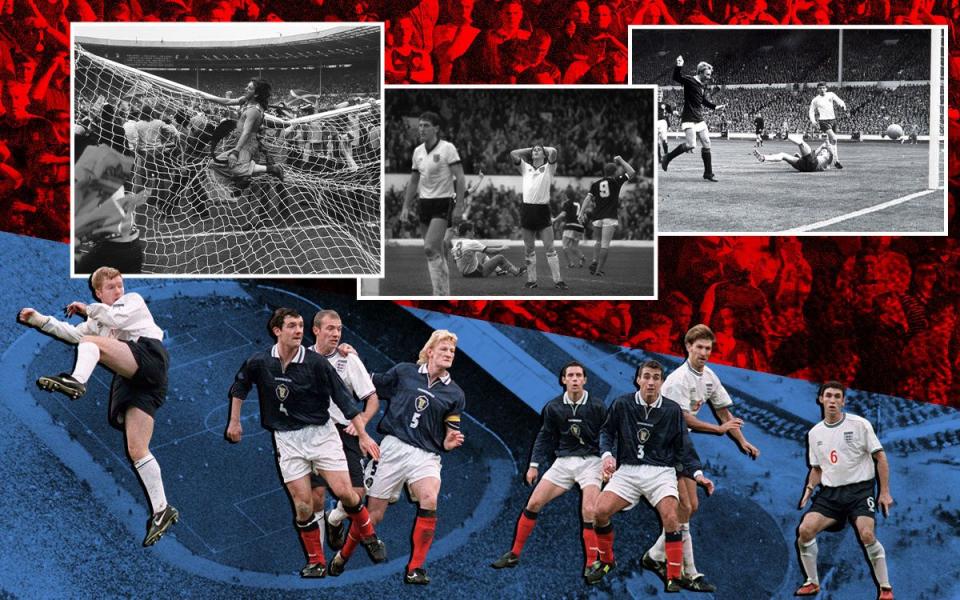
England and Scotland meet for the 115th time on Friday in a rare recent renewal of the oldest international football fixture, a rivalry that spans 149 years, long, contrasting periods of dominance and slumps and some of the most meaningful moments of each nation's rich football history.
Here, in 10 illustrations, we chart the story of Scotland against 'the Auld Enemy', from the days when it was the only truly testing international match on both country's calendars to the recent past when what was once a must-see annual occasion became a sporadic but still significant treat.
England vs Scotland's football rivalry
1872: The game that spawned a rivalry
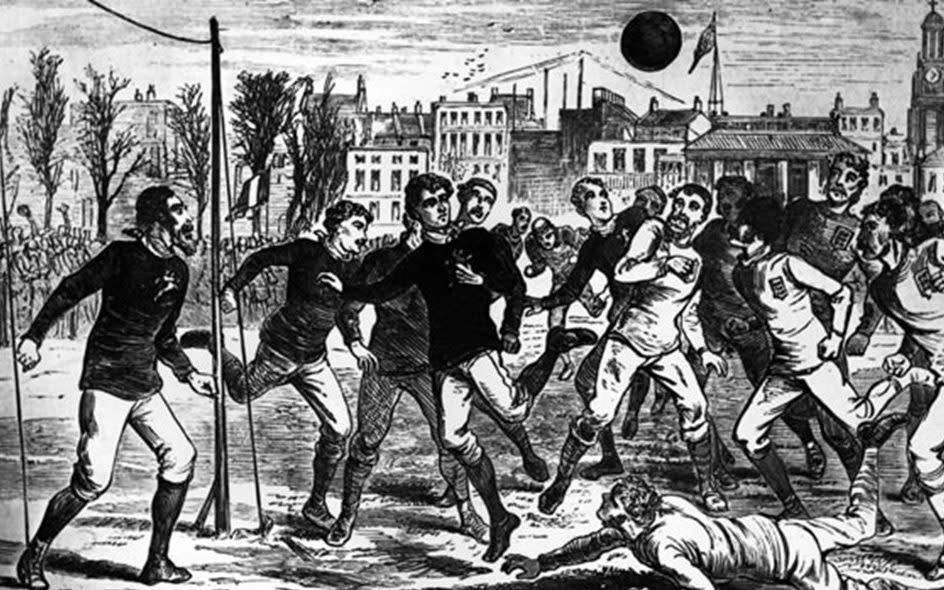
Jules Rimet and Henri Delaunay enjoy recognition throughout football because the trophies for the tournaments they devised, the World Cup in 1930 and the European Championship 30 years later, bore their names. Charles Alcock has not been so richly commemorated but the bewhiskered old Harrovian in the high stand collar, captain of England and Wanderers, secretary and treasurer of the Football Association and architect of the FA Cup, is international football’s true father.
In 1872, the same year as the inaugural Cup final, the FA, in a bid to spread its association version of the laws and win the race to standardise the game, officially challenged Scotland to a match north of Hadrian’s Wall. There had been matches in London before against a Scotland exiles XI but the absence of the best players kept crowds low. “If the mountain won’t come to Muhammad …” thought Alcock.
On Nov 30, England were held 0-0 at the West of Scotland Cricket Ground in Partick in the first properly sanctioned international. The contrast in style between the two – England with their dribbling and reliance on individual flair, Scotland with a passing game and teamwork – would mark the rivalry for 30 years.
1928: The 'Wembley Wizards'

The nadir of a troubling decade for England and the pinnacle for Scotland and their impish verve when their Lilliputian forward line of Alex ‘The Gay Cavalier’ Jackson, Jimmy ‘Ginger’ Dunn, Hughie ‘the Palmerston Wizard’ Gallacher, Alex ‘the Wee Wizard’ James and Alan ‘the Wee Blue Devil’ Morton ran rings round England on a slick pitch in a Wembley torrent.
The rain was a godsend prayed for by the captain, Jimmy McMullan, the night before and England simply couldn’t cope with the movement of Dunn and James because of a dunderheaded tactical plan which compelled their wing-halves to split to the flanks and cover the wingers. That blunder left reams of space for the dazzling Scots inside-forwards to torture the centre-half, poor Tom Wilson who had captained Huddersfield to three successive titles but was making his first and last international appearance on a chastening debut. Jackson scored a hat-trick, James bagged two and England’s consolation came only in the final minute.
“The success,” wrote the Glasgow Herald, “was primarily another demonstration that Scottish skill, science and trickery will prevail against the less attractive and simpler methods of the English style.”
James was blunter still: “We could have had 10,’ he said.
1937: 149,000 at Hampden
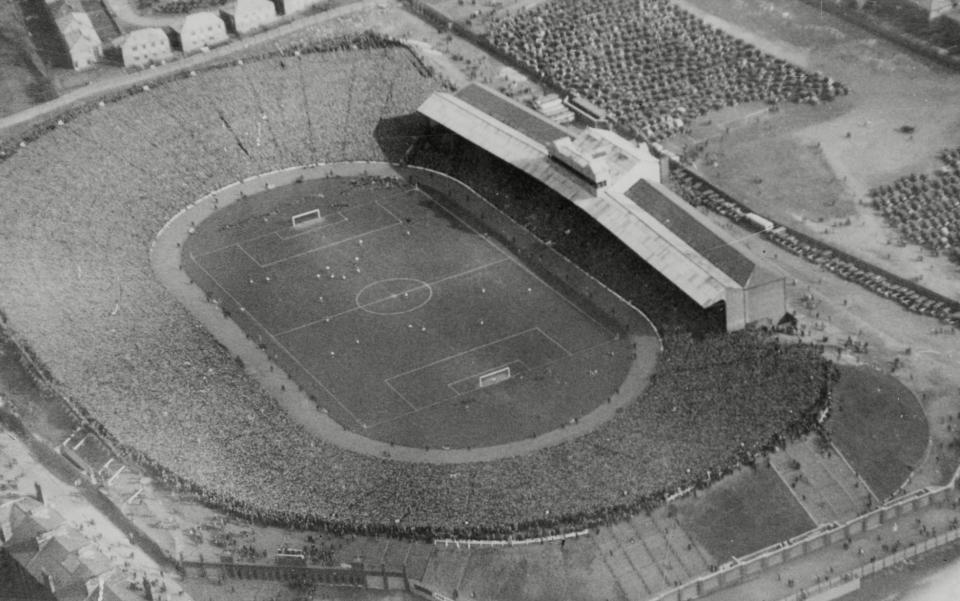
The largest ever attendance for a football match in Europe, officially 149,415 but anecdotally significantly higher, gathered for the final match of the Home Championship, already won by Wales. England, aware of the criticism of their functional style, tried a Scottish approach, giving Stanley Matthews, Freddie Steel and Joe Johnson freedom to attack in sprightly fashion, a method that surprised the hosts and earned them a 1-0 half-time lead.
But once Scotland had worked out what England were doing, they decided on all-out attack from the beginning of the second half, pouring forward with waspish menace to grab an equaliser after two minutes before Rangers’ Bob McPhail scored twice in the final 10 to secure a 3-1 victory.
Raich Carter was held responsible by the English press, the Sunderland inside-forward deemed incapable of finding his club form in an England shirt which, incidentally for the first time in an international, now had numbers on the back. One critic, in time-honoured fashion, absolved Carter but blamed the referee instead for “too prompt” whistling and being over-protective by “putting the goalkeepers in glass boxes”.
1961: Nine past Haffey

Banishing the old guard after the 1958 World Cup, England embarked on an astonishing run of form before hosting Scotland in April 1961, beating Northern Ireland 5-2, Luxembourg 9-0, Spain 4-2 and Wales 5-1 with an 8, 9 and 10 of Jimmy Greaves, Bobby Smith and the captain Johnny Haynes, plus Bobby Charlton on the left wing and Bobby Robson recalled at right-half. But capping that goalfest against a side with Dave Mackay, Billy McNeill, Denis Law and Ian St John in the line-up was extraordinary indeed.
Greaves scored three, Smith and Haynes two apiece, Robson and Bryan Douglas one each though Scotland rallied from 3-0 down at half-time to 3-2 until six goals in 10 minutes, one to the Scots, resulted in Wembley’s highest-ever scoring match.
In The Telegraph Donald Saunders wrote: “Always the English will believe the genius of captain Johnny Haynes earned glorious victory; Scotsmen will forever blame goalkeeper Frank Haffey's shortcomings for ignominious defeat.”
He was right, Celtic’s ‘hapless Haffey’, lambasted as ‘butterfingers’ and the answer to what’s the time at Wembley? – ‘Nearly 10 past Haffey’, never played for Scotland again and later became a lounge singer in Australia where he released several records including Slattery’s Mounted Fut. Three weeks later England put eight past Mexico, whose keeper Antonio Mota, as far as we know, did not turn to cabaret for comfort.
1967: 'Champions of the world'

The match that made Scotland ‘world champions’, at least in their eyes, was the first of the mass ‘invasions’ by train, coach and car that turned King’s Cross and Victoria into offshoots of Sauchiehall Street. At Wembley Scots outnumbered England supporters by as many as three to one.
They outnumbered them 11 to 10 on the field after Jack Charlton broke his toe on 15 minutes and had to hop about up front and on the wing in the last knockings of the no-substitute regulation in international football. Denis Law scored the opener, Bobby Lennox added a second with 12 minutes to go and though the 10 men rallied and Jack Charlton poked home a shot to make it 2-1, Jim McCalliog restored a two-goal lead before Geoff Hurst made it 3-2.
Scotland supporters sang "Where’s your World Cup noo?", Jim Baxter and Billy Bremner, high on Scots gallus, mocked Alan Ball for looking and sounding like Jimmy Clitheroe, Baxter sat on the ball and a nation demanded the Jules Rimet trophy be dispatched north forthwith.
Little wonder, then, that Sir Alf Ramsey once confided in Brian Labone: “I don’t mind the Irish, I don’t mind the Welsh but I hate the f------’ Scots.”
1977: A broken crossbar
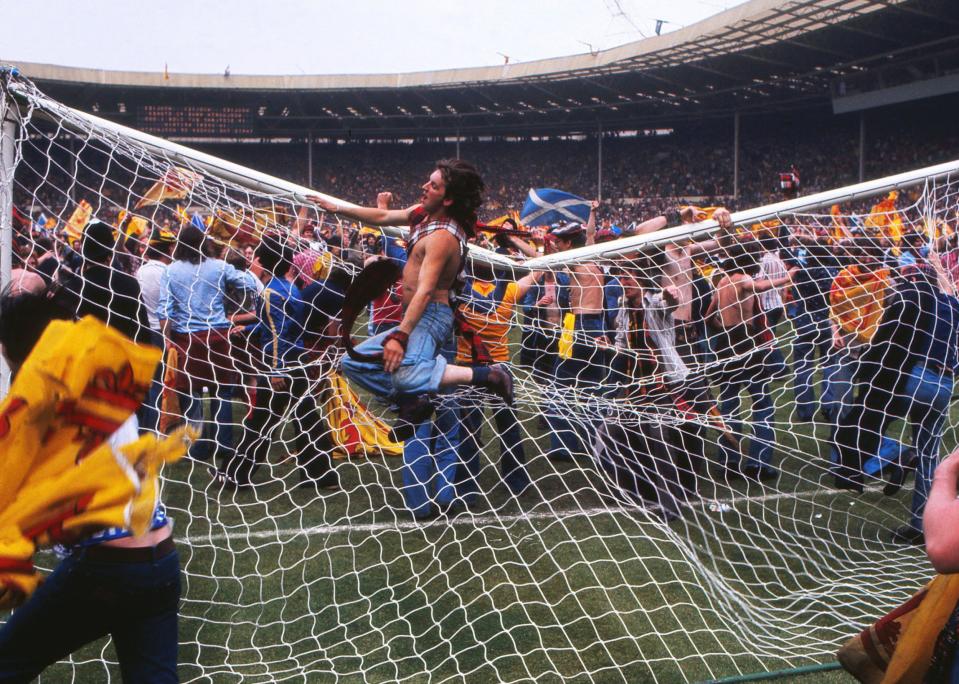
A 2-1 victory for Scotland, memorable for the moment Kenny Dalglish scored the winner past Ray Clemence, which must have given them a conversational ice-breaker when ‘King Kenny joined Liverpool a few weeks later. All that was overshadowed by the pitch invasion at the final whistle by the hordes of visiting supporters delighted to have some revenge for the 5-1 humiliation two years earlier.
The goalposts were scaled, the cross-bar broken and large pieces of the pitch were transplanted home to Scotland as enduring souvenirs. There were 289 arrests and fines of £100 were dished out for disorderly behaviour at Bow Street Magistrates on the Monday for their part in what the papers called ‘The Battle of Wembley’. In truth it was more of an incursion than a stramash, by thousands of Bay City Rollers lookalikes buzzing on Tartan Special and the illicit joy of trespass.
The Daily Mirror splashed a picture of one brash turf burgler in his tam o’shanter proudly holding aloft a 4ft square piece of grass beneath the headline ‘Jock the Ripper’. Pointed questions were asked in parliament and measures imposed that meant there could be no repeat. Fences were erected and henceforth the fans were caged in at Wembley for the next 11 years.
1985: The low point
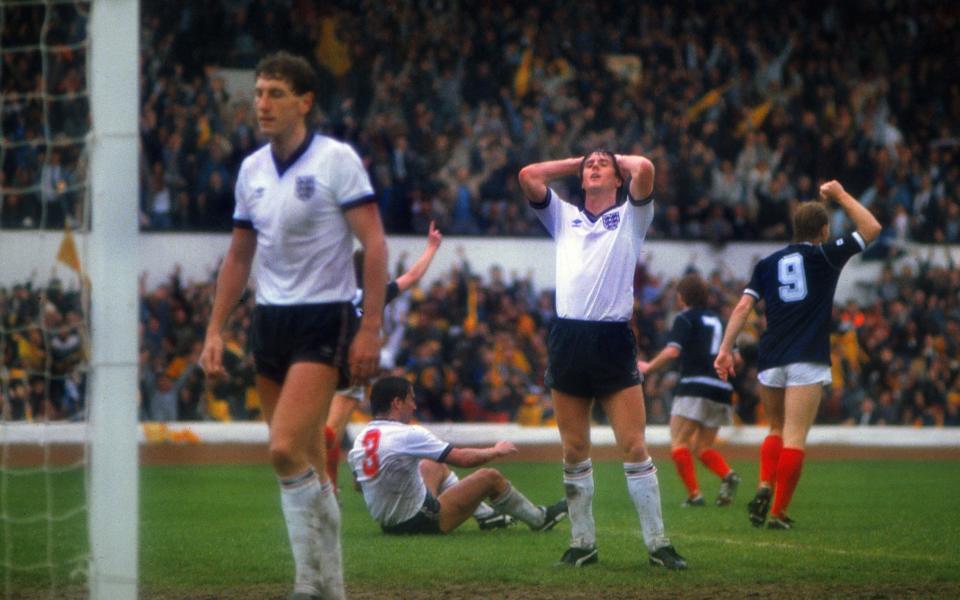
Both teams having pulled out of the Home Championship in 1984, to leave Northern Ireland as reigning champions for the past 37 years, Scotland and England grubbily agreed to make the one money-spinning fixture an annual event and called it the Rous Cup. Scotland claimed their only victory in the competition, which petered out unlamented in 1989, by virtue of Richard Gough’s 68th-minute headed goal.
Fittingly Sir Stanley Rous, who had been one of the linesmen for the Wembley Wizards match in 1928 before ruling the roost at the FA and Fifa, was on hand at Hampden Park, at the grand old age of 90, to present ‘his’ cup to Graeme Souness as captain of Jock Stein’s side.
For England, always darkest before the dawn, Gary Lineker and Chris Waddle each won his fourth cap as second-half substitutes but they would be given proper opportunities over the next year as Bobby Robson’s side took a more progressive turn.
1996: McAllister's agony

England began their second Euro 96 Group A game as drably as they had finished the first, a 1-1 draw with Switzerland matched by Scotland’s goalless draw with Holland. But the inspired half-time introduction of Jamie Redknapp for Stuart Pearce transformed England’s midfield and his movement and passing alongside Paul Gascoigne opened up Scotland’s defence.
Alan Shearer put England 1-0 up after 53 minutes but when Tony Adams brought down Gordon Durie in the England penalty box 25 minutes later, the Scotland fans’ cheers drowned out the exasperation of the home supporters. Gary McAllister, Scotland’s captain, pulled rank on Ally McCoist who offered to take the penalty and placed the ball on the spot. Between the start of his run-up and striking the ball with his right instep, the ball rolled two inches off the spot to the left and his shot thundered into the diving David Seaman’s raised elbow and away from goal.
Within 45 seconds Paul Gascoigne had twisted Colin Hendry’s blood and scored an imperishable second with assists from McAllister and Seaman but not incorrigible self-publicist Uri Geller, who claimed to have moved the ball with the ‘mind-power’ that he formerly ‘used’ to mutilate a thousand spoons.
1999: Scholes' high point
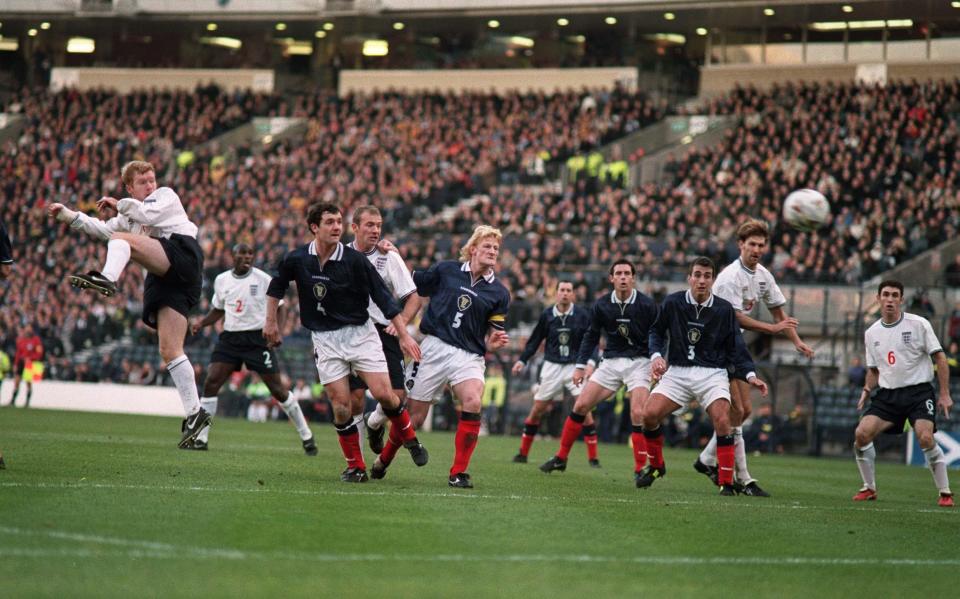
England’s only appearance in a qualifying play-off for a tournament pitted them against one of four higher-seeded teams which, given it might have been Portugal, Turkey or Denmark, they had just cause to celebrate. The bloom had gone off the side after the 1998 World Cup and Kevin Keegan had been brought in to replace Glenn Hoddle’s cerebral approach with heart and passion.
Despite a lop-sided defence and midfield, Paul Scholes scored two first-half goals in the first leg at Hampden, the second one a bullet header from a David Beckham free-kick, straight off Manchester United’s academy training ground at the Cliff. After an impressive 45 minutes England retreated into their shells for the remaining 135 minutes of the tie, holding out for a 2-0 victory in Glasgow but courting disaster at Wembley where Don Hutchsion’s goal gave Scotland a first victory since 1981.
England crept into Euro 2000 via the backdoor and proceeded to expose their timid, guileless shortcomings on a grander stage.
2017: Last time out
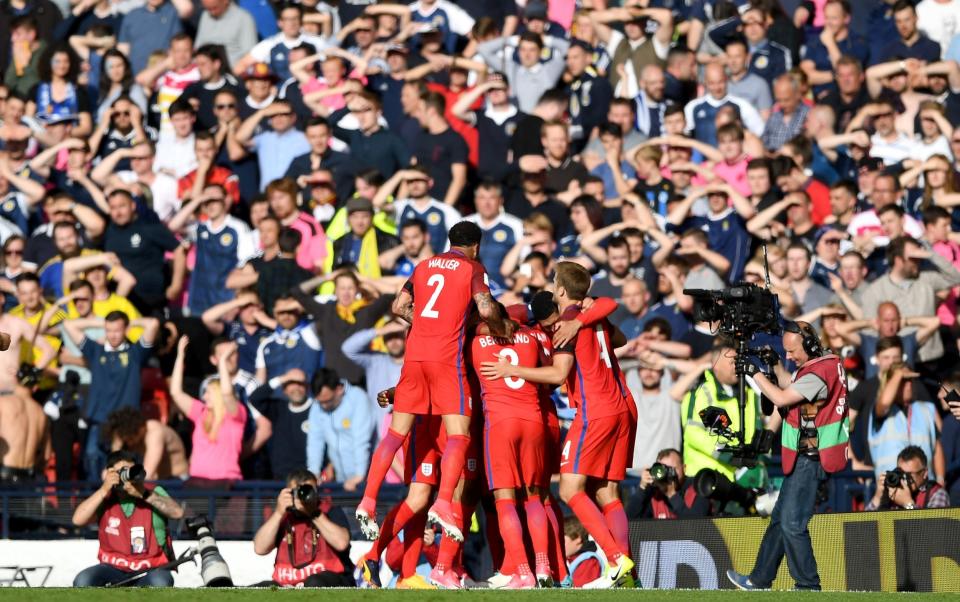
The last meeting before Friday’s 115th match was the sixth of 10 Group F qualifiers for the 2018 World Cup and came seven months after England had won the home tie 3-0. It was a pretty mundane match for 87 minutes when England led through Alex Oxlade-Chamberlain’s goal. But then twice in three minutes Leigh Griffiths scored from free-kicks as the clock ticked past 90 minutes, bending in shots that beat an increasingly unreliable Joe Hart, who had been sent to exile in Turin by Manchester City’s Pep Guardiola, on his left and right sides.
England, who generally stank out tournaments, had, nonetheless, not lost a qualifying game in eight years and cometh the 93rdminute cometh the captain Harry Kane to stretch that run to 35 matches by turning in Raheem Sterling’s cross at the far post.
The old place went from an air of resignation and doom to a long lost Hampden Roar in full-throated exultation for seven minutes to the sound of anguish and then silence.

